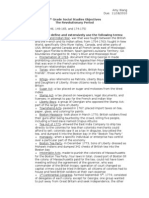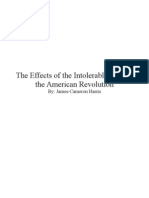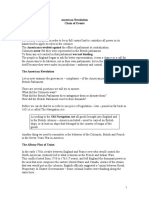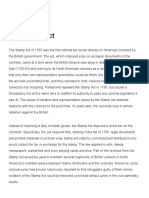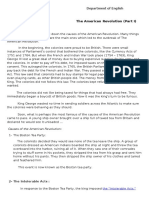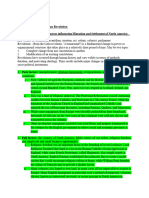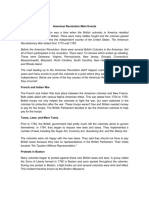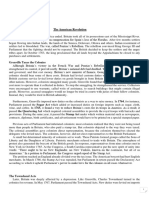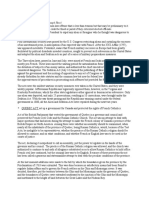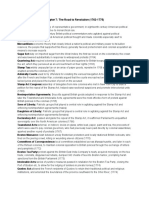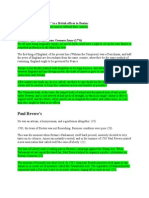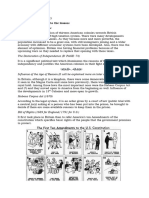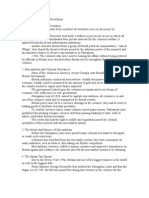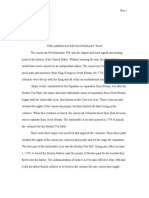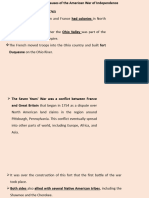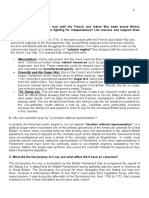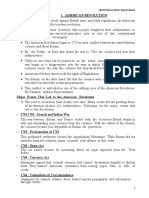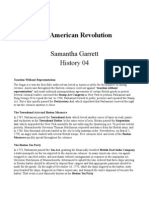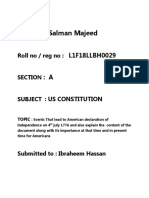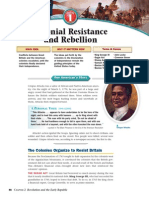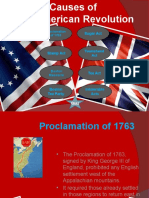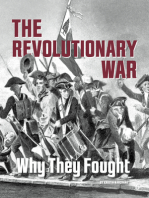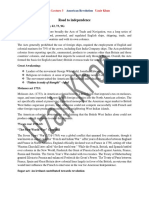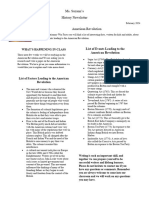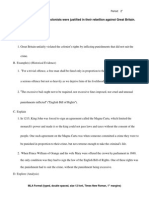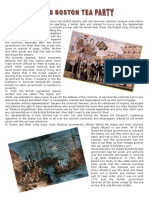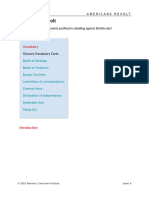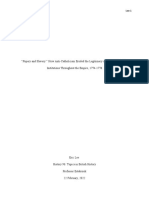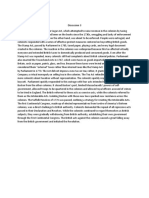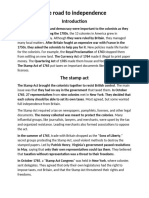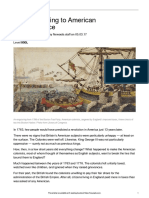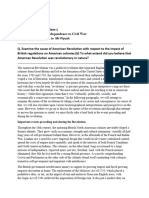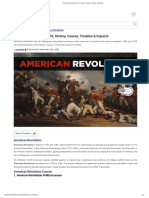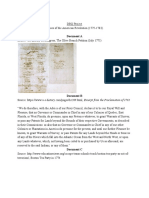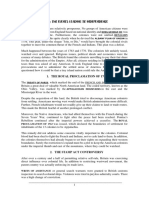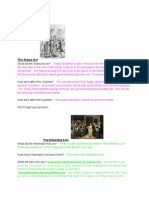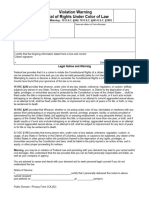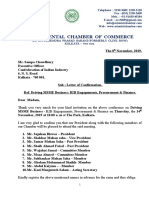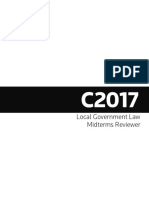The Intolerable Acts
The Intolerable Acts
Uploaded by
api-237101028Copyright:
Available Formats
The Intolerable Acts
The Intolerable Acts
Uploaded by
api-237101028Original Title
Copyright
Available Formats
Share this document
Did you find this document useful?
Is this content inappropriate?
Copyright:
Available Formats
The Intolerable Acts
The Intolerable Acts
Uploaded by
api-237101028Copyright:
Available Formats
The Intolerable Acts
Article By: Victoria Lam
The Picture (1774) (Above) is a depiction of how the colonists reacted to taxes; they took their anger at tax collectors. The picture on the right is a drawing depicting the Boston Port Act. British ships blocked any imports or exports coming or sending from Boston.
Was there ever a rule or term someone had made that was intolerable? There were laws that were intolerable for colonists in colonial times. They were called the Intolerable Acts. These acts were significant, because they had caused an important event in history to trigger. They were made by the British Parliament and were intended to punish the colonists. For what, you ask. Well, it was for an intolerable action that the colonists had done, which made the British Parliament make the Intolerable Acts. It was certainly intolerable. On December 16, 1773, the Sons of Liberty, a group of patriots, angry and enraged by the laws and taxes enforced by the British dumped imported tea from ships that officials refused to return back to British when colonists asked for it to be returned. They had dumped 342 chests of tea into the water, leaving merchants and traders in poverty. This event was called The Boston Tea Party. As mentioned, this was a significant event, because it had led to the American Revolution, because it had caused the Acts to be made, which led to the Revolution. On the Morning of December 17 , officials discovered empty ships and chests of tea floating around in the water. The Parliament was absolutely furious; they could take all the protests by the colonists; however they could not take this one. The colonists had to be punished; it was the last straw. In 1774, the Parliament made four acts, which as previously stated was called the Intolerable Acts, in response to the Boston Tea Party. The fifth, the Quebec Act, was not a direct response to the Boston Tea party, but was passed the same time the legislature passed the others and was seen as an Intolerable act by the people. The acts were indeed intolerable, but it was a punishment for the colonists for their actions. The first act was the Boston Port Act, and it was passed on March 31, 1774. It had taken effect on June 1. The act had stated that no ships were permitted in or out to the Port, meaning that colonists would have a harder time earning money or getting the resources they needed. Until payments of the damage the colonists caused were made, the Royal Navy and Armys ships blocked the port and the colony was full of soldiers who patrolled the port. This was harsh, but the other acts were certainly harsher compared to this one. The second act was the Massachusetts Government Act, and it was passed on May 20 , 1774. Colonists lost most of their power to vote and now the colony was controlled directly by the king or governors he assigned. Colonists could not also vote for members of the Executive Council which they were able to do before the laws
th th
were passed. The colonists were stripped of their power, because officials thought that a cause of the event was due to the lack of governmental power among the people. The colonists were also banned from having town meetings. This act greatly angered the colonists especially; however there was more to it than just being stripped of power. The third act was the Administration of Justice Act (referred to the Murder Act by colonists, because officials could get away with murder), and it was passed on May 20, 1774. It stated that any British officials charged with Capital offences could be sent to another colony or be sent back to Britain for trial. This act was meant to protect the officials, because the government felt it would be unfair to hold trials for an official with colonists watching, because they could easily lie if they didnt like the official. This seemed fair, because some of the colonists really disliked the officials, but the colonists were also very angry at this law, but if youd ask me, the third act was potentially better and less harsh than the other acts. The fourth act was the Quartering Act was passed on June 4, 1774. Unlike the old Quartering Act of 1765 which stated that soldiers could be housed in unused buildings and inns and owners had to provide free food and supplies, the fourth act had stated that soldiers could be housed in private homes of colonists. Obviously, this made the colonists angry. Soldiers could be housed in private homes, which today we could refuse, but in 1774 was a law. It was also an invasion of privacy and soldiers that were lazy or with rotten personality still received free food and supplies. Also, the soldiers could have done anything in the house, including illegal things to the house or the owner. Doesnt that sound absolutely terrible!? The fifth act was the Quebec Act and was passed on June 22, 1774 and put into action on May 1, 1775 (thats right; about a year later). As stated previously, this was not a direct response to the Boston Tea Party. Basically, it expanded Quebec and let them have religious freedoms which appealed to the Catholic Church. The land expansion included Illinois, Indiana, Michigan, Ohio, Wisconsin and Minnesota. This was considered an intolerable act, because some of the colonies and colonists had already settled there. Even George Washington was angry, because it did not let other colonies expand their land and give them a chance to explore. This act had not been directly towards the Tea Party, but everyone was affected and angry, so it was considered intolerable. The colonists were obviously angry and enraged of these acts, however they did not last very long or at least they did not stop the colonists. For example, the other thirteen colonies began to send supplies to Boston after the Port Act was passed. This was one of the first time the thirteen colonies worked and came together. Also, in 1778, the British had taken down the Massachusetts Government Law in an attempt to stop the American Revolution. The Quartering Act was no longer in effect on March 27, 1776. The Administration of Justice Law did not last long either due to the American Revolution. The laws barely scratched the colonists at all. As repeated constantly, the American Revolution had followed shortly and many laws were repealed in an attempt to stop the Revolution. The unification of the thirteen colonies and the people had overcame the British and their King and brought independence to the colonies along with the famous Declaration of Independence which was signed by a variety of historical figures. The Intolerable Acts was a significant key to independence for the colonies, and without the acts, we would probably not have our modern clothes or technology (though some 18-th Century colonists might disagree and would strongly disagree), and we would be wearing fancy coats with funny-looking hats and many other different races of people would probably not be here either.
You might also like
- Galle.: ResidenceDocument5 pagesGalle.: ResidenceChathura Bookshop & CommunicationNo ratings yet
- 8th Grade The Revolutionary Period Social Studies ObjectivesDocument5 pages8th Grade The Revolutionary Period Social Studies ObjectivesSebastian FernandezNo ratings yet
- Course Syllabus - Philippine History With GovernanceDocument4 pagesCourse Syllabus - Philippine History With GovernanceJenny Malabrigo, MBA100% (2)
- Project On Rehabilitation and Resettlement Under The Rfctlarr Act, 2013 - Submitted ToDocument19 pagesProject On Rehabilitation and Resettlement Under The Rfctlarr Act, 2013 - Submitted ToAmit kayallNo ratings yet
- What Acts Were Intolerable Acts? US History Textbook | Children's American HistoryFrom EverandWhat Acts Were Intolerable Acts? US History Textbook | Children's American HistoryNo ratings yet
- Discussion Post 2Document2 pagesDiscussion Post 2Skittles VanportfleetNo ratings yet
- The Causes of The American RevolutionDocument8 pagesThe Causes of The American Revolutionbmoneybookings100No ratings yet
- The Effects of The Intolerable Acts On The American RevolutionDocument7 pagesThe Effects of The Intolerable Acts On The American RevolutionJames-Cameron HarrisNo ratings yet
- American Revolution DocumentDocument7 pagesAmerican Revolution DocumentSarah AkkaouiNo ratings yet
- ThestampactDocument3 pagesThestampactapi-355864571No ratings yet
- Why IndependenceDocument7 pagesWhy IndependenceLoyiso MbelebeleNo ratings yet
- The American Revolution (Part I) : Ascc: L2 (G1-G4) Department of EnglishDocument4 pagesThe American Revolution (Part I) : Ascc: L2 (G1-G4) Department of EnglishBerr WalidNo ratings yet
- Standard - AmericanRevolutionFlowMapProjectDocument3 pagesStandard - AmericanRevolutionFlowMapProjectclairee.silkNo ratings yet
- HandoutDocument3 pagesHandoutSebastiaan BentNo ratings yet
- American Revolution Main EventsDocument2 pagesAmerican Revolution Main EventsClaudia KimNo ratings yet
- Grenville Taxes The ColoniesDocument4 pagesGrenville Taxes The Coloniesfmouloud1982No ratings yet
- Causes of American RevolutionDocument6 pagesCauses of American RevolutionKeenaLiNo ratings yet
- CH 7 KeytermsDocument5 pagesCH 7 Keytermsapi-366289413No ratings yet
- Chronology Cards 1Document5 pagesChronology Cards 1api-341625144No ratings yet
- Paul Revere's: A "Lady From Philadelphia" To A British Officer in BostonDocument6 pagesPaul Revere's: A "Lady From Philadelphia" To A British Officer in BostonYvonne HoangNo ratings yet
- AKT Final Notları - 1Document5 pagesAKT Final Notları - 1vbcdsrt77bNo ratings yet
- Chapter 7 APUSH NotesDocument5 pagesChapter 7 APUSH NotesSaadia MiranNo ratings yet
- TheintolerableactsDocument2 pagesTheintolerableactsapi-355864571No ratings yet
- Timeline EssayDocument3 pagesTimeline EssayLaura 'Lovely' FrisNo ratings yet
- Causes of American RevolutionDocument31 pagesCauses of American RevolutionAlfredNo ratings yet
- The American RevolutionDocument4 pagesThe American RevolutionStefania SchmidtNo ratings yet
- Adobe Scan 03-Mar-2023Document4 pagesAdobe Scan 03-Mar-2023Aashi SinghNo ratings yet
- American RevolutionDocument15 pagesAmerican RevolutionSmash UpNo ratings yet
- American Revolution: World History Notes-Rajesh NayakDocument6 pagesAmerican Revolution: World History Notes-Rajesh NayakRohit Saxena100% (1)
- Explaining the Stamp and Townshend Acts - US History for Kids | Children's American HistoryFrom EverandExplaining the Stamp and Townshend Acts - US History for Kids | Children's American HistoryNo ratings yet
- The American Revolutio1Document2 pagesThe American Revolutio1Sammi Lovesyouthemostestest GarrettNo ratings yet
- M Salman Majeed: L1F18LLBH0029: ADocument15 pagesM Salman Majeed: L1F18LLBH0029: ASalman malikNo ratings yet
- CausesofrevchartDocument5 pagesCausesofrevchartapi-236326975No ratings yet
- The Americans 2.1 - pg46 - 57Document12 pagesThe Americans 2.1 - pg46 - 57Joe BradleyNo ratings yet
- Sugar Act: Proclamation of 1763Document36 pagesSugar Act: Proclamation of 1763api-328472919No ratings yet
- Lecture 3 Independence Lecture UpdatedDocument6 pagesLecture 3 Independence Lecture UpdatedQamar SohailNo ratings yet
- History NewsletterDocument2 pagesHistory Newsletterapi-731025032No ratings yet
- Geitheim Rights of Englishmen Peer Outline 20144Document4 pagesGeitheim Rights of Englishmen Peer Outline 20144api-208377940No ratings yet
- History of USA Lesson 3: The War of IndependenceDocument3 pagesHistory of USA Lesson 3: The War of Independencesmiedt ancutaNo ratings yet
- Stamp Act and Bston Tea Party ActivityDocument2 pagesStamp Act and Bston Tea Party ActivityEnglish4allNo ratings yet
- The Declaration of Independence-Summary 2Document2 pagesThe Declaration of Independence-Summary 2Padmavathi ArulmozhiNo ratings yet
- American Revolt Reading TCIDocument43 pagesAmerican Revolt Reading TCItianrun.guNo ratings yet
- "Popery and Slavery:" How Anti-Catholicism Eroded The Legitimacy of British Governing Institutions Throughout The Empire, 1774-1776Document23 pages"Popery and Slavery:" How Anti-Catholicism Eroded The Legitimacy of British Governing Institutions Throughout The Empire, 1774-1776Eric LeeNo ratings yet
- Discussion 3Document1 pageDiscussion 3Myesha TrappNo ratings yet
- Solution Manual For Engineering Fundamentals and Problem Solving 7th Edition by Eide Jenison Northup Mickelson ISBN 0073385913 9780073385914Document36 pagesSolution Manual For Engineering Fundamentals and Problem Solving 7th Edition by Eide Jenison Northup Mickelson ISBN 0073385913 9780073385914jesusdiazjztioknaxb100% (40)
- Chapter 3Document3 pagesChapter 3Uta JibutiNo ratings yet
- Battle for a New Nation: Causes and Effects of the Revolutionary WarFrom EverandBattle for a New Nation: Causes and Effects of the Revolutionary WarNo ratings yet
- The American Revolutionary War (1775-1783): The war for American independence from British colonial ruleFrom EverandThe American Revolutionary War (1775-1783): The war for American independence from British colonial ruleNo ratings yet
- American Revolution: Discuss The Causes, Nature, and Significance of The American RevolutionDocument4 pagesAmerican Revolution: Discuss The Causes, Nature, and Significance of The American RevolutionRamita Udayashankar100% (4)
- RevwarDocument6 pagesRevwarapi-142630794No ratings yet
- The Colonial Response To The Stamp Act of 1765 Was One of Outrage and ResistanceDocument2 pagesThe Colonial Response To The Stamp Act of 1765 Was One of Outrage and Resistanceseniorcaptain423No ratings yet
- Events Leading To The American RevolutionDocument9 pagesEvents Leading To The American Revolutionapi-524592800No ratings yet
- Declaratory ActDocument2 pagesDeclaratory ActKim Patrick Guevarra100% (1)
- Himani AssignmentDocument9 pagesHimani Assignmentsinghdm2004No ratings yet
- American Revolution 1776, History, Causes, Timeline & ImpactsDocument4 pagesAmerican Revolution 1776, History, Causes, Timeline & ImpactsFaizaNo ratings yet
- DBQ ProjectDocument5 pagesDBQ ProjectOlivia AnthonyNo ratings yet
- Wuolah Free UNIT 9 Gulag FreeDocument6 pagesWuolah Free UNIT 9 Gulag Freecypherlove2004No ratings yet
- Maeganb LifeeventsquestionsDocument3 pagesMaeganb Lifeeventsquestionsapi-281822653No ratings yet
- APUSH Chapter 7 NotesDocument4 pagesAPUSH Chapter 7 Notesphthysyllysm100% (1)
- The Suharto OligarchyDocument24 pagesThe Suharto OligarchyKarya BangunanNo ratings yet
- Should India Be Divided Into Further States?: Additional DetailsDocument26 pagesShould India Be Divided Into Further States?: Additional Detailssumit_ravanNo ratings yet
- National Company Law Appellate Tribunal Checklist For Appeals Under Companies Act, 2013 & Insolvency and Bankruptcy Code, 2016Document5 pagesNational Company Law Appellate Tribunal Checklist For Appeals Under Companies Act, 2013 & Insolvency and Bankruptcy Code, 2016DEBASHIS MUKHERJEENo ratings yet
- Japanese OccupationDocument12 pagesJapanese OccupationtrixiaNo ratings yet
- Subsidiary ImprisonmentDocument2 pagesSubsidiary ImprisonmentRose Ann CalanglangNo ratings yet
- First 500 CCP Members FinalDocument48 pagesFirst 500 CCP Members FinalTraceyNo ratings yet
- Group 3 Good PresentationDocument12 pagesGroup 3 Good PresentationDickson Tk Chuma Jr.No ratings yet
- City Council Candidate Robert Schorr's Response To Mayor Jeff SmithDocument2 pagesCity Council Candidate Robert Schorr's Response To Mayor Jeff SmithNewzjunkyNo ratings yet
- 2 SUCCESSION Reyes Vs Barretto DatuDocument2 pages2 SUCCESSION Reyes Vs Barretto DatuKaren TorresNo ratings yet
- Student Electoral Commission (Elective-Position-Ssg-2021 Selecom)Document8 pagesStudent Electoral Commission (Elective-Position-Ssg-2021 Selecom)Jack BuhaweNo ratings yet
- QM 769 PL 2319 - CRSDocument1 pageQM 769 PL 2319 - CRSGaneshNo ratings yet
- 18 242 Denial of Rights Under Color of LawDocument1 page18 242 Denial of Rights Under Color of LawzachariastaxesNo ratings yet
- Discuss The Use of Force in Consolidating An Authoritarian Leaders Maintenance of PowerDocument4 pagesDiscuss The Use of Force in Consolidating An Authoritarian Leaders Maintenance of PowerpearlynpuayNo ratings yet
- Letter of Confirmation Regarding Driving MSME Business - B2B Engagements, Procurement & Finance For SirDocument4 pagesLetter of Confirmation Regarding Driving MSME Business - B2B Engagements, Procurement & Finance For SirThe Oriental Chamber of CommerceNo ratings yet
- Project Leadership ProcessDocument11 pagesProject Leadership ProcessCitra Nur IkhsaniNo ratings yet
- CHAPTER 2 - HistoryDocument2 pagesCHAPTER 2 - HistoryAlmira MejoradaNo ratings yet
- Anonymous V RadamDocument1 pageAnonymous V Radamdnel13No ratings yet
- Red Hill Creek Expressway - FinalDocument28 pagesRed Hill Creek Expressway - FinalErnest YanarellaNo ratings yet
- Special Contract Registration of FirmsDocument30 pagesSpecial Contract Registration of FirmsHarsh ShahNo ratings yet
- Contemporary World Lesson 3-5Document28 pagesContemporary World Lesson 3-5Evelyn Medina100% (1)
- Appendix 7 - Patent Declaration FormDocument4 pagesAppendix 7 - Patent Declaration FormWilliam ChandraNo ratings yet
- Dr. Martin Luther King, JRDocument1 pageDr. Martin Luther King, JRJessica PharrNo ratings yet
- Saikat BhuDocument3 pagesSaikat Bhusouvik mondalNo ratings yet
- Azmuddin Devorce DeclarationDocument16 pagesAzmuddin Devorce Declarationdevraj vishalNo ratings yet
- Incident Command SystemDocument8 pagesIncident Command SystemIndira Requiron-PuspusNo ratings yet
- What Are The Essential of A Good ConstitutionDocument2 pagesWhat Are The Essential of A Good ConstitutionIan Bajada100% (1)
- C2017 LocGov Midterm Reviewer IncompleteDocument61 pagesC2017 LocGov Midterm Reviewer IncompleteJul A.No ratings yet

